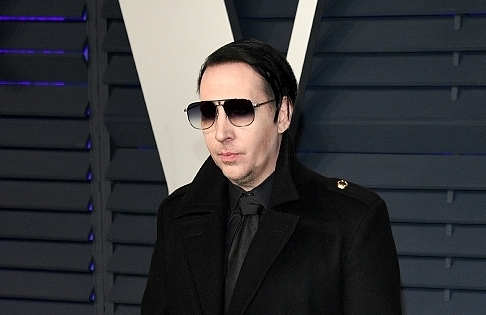Violence on trial in US entertainment industry
- By Mitchell Blatt
 0 Comment(s)
0 Comment(s) Print
Print E-mail China.org.cn, June 20, 2022
E-mail China.org.cn, June 20, 2022

When I was 16 years old, I reviewed a Marilyn Manson concert in Cleveland, Ohio, for a local music magazine. He wielded a microphone shaped like a knife, and he tore pages out of a Bible during his performance.
The metal singer and performer was already infamous for his controversial performances back then. The show was entertaining, as I recall, but the antics, by that time, felt mild and commercially honed.
Rock 'n' roll has always been an enterprise built on antagonizing the old conservative prudes. The young love loud and fast music, trying new fun things, and disobeying authority. So it's easy to understand the appeal of Manson. I can still respect the music he made, even if my tastes expanded and changed. And it's just as easy to understand why Manson was attacked by many who accused him of being responsible for inspiring school shooters or otherwise negatively influencing kids.
But just because Manson was absolved of guilt in the case of one contrived narrative doesn't mean he is innocent of other crimes he might have committed. What is most disturbing is how he was later accused of terrorizing the women he has met or been with.
His former fiancé Evan Rachel Wood and ex-girlfriends Esme Bianco and Ashley Morgan Smithline, as well as multiple others, came forward in 2021 accusing Manson of sexual abuse. But Manson claimed his relationships were consensual.
Now some of his exes have filed suits against Manson, and he has filed defamation suits against some of them. There is reason to be concerned that celebrities accused of sexual improprieties could use the legal system to intimidate victims from making claims. It is hard to predict how the case might play out.
In this case, so much of what is alleged that Manson did to his intimate partners reflects the very image he created of himself. At his early concerts, he used to have people on stage locked in cages.
Should an entertainer be condemned as guilty based on the image he created of himself? He was a shock rocker. Whether or not he did those things and whether or not it was consensual is at issue.
No, it's not his stage image that is immoral, it is his real-life acts. It is, for example, what he says about himself in his memoir. In "The Long Hard Road Out of Hell," published in 1998, he described a number of actions that would constitute sexual assault. And he also mentioned similar behaviors in a 2009 interview when he talked about his former fiancé Evan Rachel Wood.
When Manson described himself as having committed sexual assault two and a half decades ago in his memoir, it barely registered any controversy. Whatever happens in his trial, the problem is bigger than just him.
The entertainment industry is slowly facing a reckoning. I could use any number of musicians as individual examples of a culture of violence in the entertainment industry. Its critics, too, must learn to make distinctions and hone in on the real problems. Marilyn Manson isn't immoral because he pursued artistic freedom via over-the-top performance art meant to offend prudes.
However, he would be immoral if he violated the freedom of others in his relationships, as alleged. In that case, it seems that he instead appealed more to the same old-fashioned chauvinistic values his critics at the time held.
Mitchell Blatt is a columnist with China.org.cn. For more information please visit:
http://www.china.org.cn/opinion/MitchellBlatt.htm
Opinion articles reflect the views of their authors, not necessarily those of China.org.cn.
If you would like to contribute, please contact us at opinion@china.org.cn.






Go to Forum >>0 Comment(s)